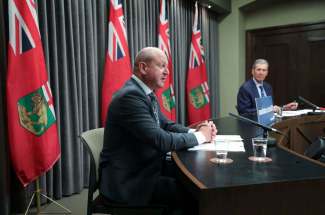Don’t diminish access to information
Read this article for free:
or
Already have an account? Log in here »
To continue reading, please subscribe:
Monthly Digital Subscription
$0 for the first 4 weeks*
- Enjoy unlimited reading on winnipegfreepress.com
- Read the E-Edition, our digital replica newspaper
- Access News Break, our award-winning app
- Play interactive puzzles
*No charge for 4 weeks then price increases to the regular rate of $19.00 plus GST every four weeks. Offer available to new and qualified returning subscribers only. Cancel any time.
Monthly Digital Subscription
$4.75/week*
- Enjoy unlimited reading on winnipegfreepress.com
- Read the E-Edition, our digital replica newspaper
- Access News Break, our award-winning app
- Play interactive puzzles
*Billed as $19 plus GST every four weeks. Cancel any time.
To continue reading, please subscribe:
Add Free Press access to your Brandon Sun subscription for only an additional
$1 for the first 4 weeks*
*Your next subscription payment will increase by $1.00 and you will be charged $16.99 plus GST for four weeks. After four weeks, your payment will increase to $23.99 plus GST every four weeks.
Read unlimited articles for free today:
or
Already have an account? Log in here »
Hey there, time traveller!
This article was published 22/04/2021 (1697 days ago), so information in it may no longer be current.
When the stakes are as high as the health of our family and friends, it’s understandable many people are keenly interested in accurate and complete COVID-19 information. They’re not getting it in Manitoba, however, and the flow of information could become even more restricted if the provincial government gets its way.
Manitoba’s ombudsman has written a letter to the Progressive Conservative government that pending legislation will make it more difficult for the public and the media to access government information.
Ombudsman concerned about access to information bill

Posted:
MANITOBA’S ombudsman has written a six-page letter to the government expressing concern that pending legislation will make accessing information more difficult.
The proposed changes to the Freedom of Information and Protection of Privacy Amendment Act will increase the deadline for responses to requests for information to up to 90 days from the current limit of 30 days, which would be the longest wait allowed in Canada. Other changes would let the government disregard requests that are deemed too repetitive, too broad or — to use the proposal’s alarmingly vague wording — if the request is thought to “interfere with operations” or “legal privilege.”
Information about the pandemic is only a small part of the wide range of information issues covered by Bill 49, but the government’s close-fisted hold on pandemic information is illustrative. The proposal to further restrict information access is coming from a government that routinely dodges media questions about the pandemic as if it has an institutional allergy to transparency.
News conferences with health officials are frequent, and Premier Brian Pallister occasionally attends, but communication staff dictate the order and number of questions that can be asked, with journalists limited to a single question and follow-up. The answers — many would be more accurately called non-answers — often give only partial information or sidestep questions altogether.
For example, the government won’t disclose whether people coming into Manitoba have been ticketed for breaking interprovincial travel restrictions and failing to isolate for 14 days, even though publicizing such information could help warn other incoming travellers they could be fined up to $1,296 if they don’t quarantine.
The province has repeatedly refused to provide complete information on where people are getting COVID-19 in Manitoba and whether certain activities — perhaps going to church, work or hair salons — lead to more infections in comparison to other behaviours. Manitoba could learn from other jurisdictions, including Ottawa, that provide comprehensive transmission information.
The government of Manitoba has comprehensive modelling information, thought to be updated every three weeks, that projects different scenarios for the future path of COVID-19 transmission. Interested in how the transmission rate is expected to proceed in your region? The government won’t tell the media, so the media can’t tell the public.
What percentage of health-care workers has been vaccinated? What is the immunization rate by postal code? Good questions, asked by the media, not answered by the government.

This is the information-hoarding pattern of a government that has already given second reading to a bill that will make it much tougher for the public, the media, lobbyists and opposition parties to pry out facts about a wide range of topics, including the pandemic.
No one suggests access to government information should be absolute. Freedom-of-information laws contain exemptions to withhold information that could undermine the operation of government or violate individuals’ privacy, such as releasing someone’s health records.
But the hush-it-up tendency of the sitting Manitoba government indicates an administration that has scant regard for the rights of citizens to access government information, which is a crucial pillar of a free and democratic society.
To be clear, government information is not owned by incumbent administrations to be used as a method of control for its political advantage. The information is owned by the citizens of Manitoba.
Mr. Pallister’s administration is just the current gatekeeper of the information. The gate would be closed tighter under the proposed legislation, further hiding information Manitobans have a right to know.








